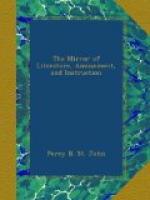We know not how to have done with these pleasures of “linked sweetness”—this “mosaic of the air,” as Marvell quaintly calls it. We have a decided aversion to the system of borrowing, which, in the absence of our own musical resources, seems to be universally adopted. Thus, as Charles Mathews says, “every footman whistles Frieschutz;” and the barrel organ which does not play two or three of its airs may be consigned to the brokers. A few months since every bachelor hummed or whistled “C’est l’amour,” and the French, to return the compliment, have made our “Robin Adair,” one of the claptraps of the music of their La Dame Blanche. Next, when will Mr. Bishop’s Home, sweet home, be forgotten, although the original is a Sicilian air of considerable antiquity. All the baker’s and butcher’s boys in London can go through “Di tanti pal”—where they leave off, answer a question, and take up the “piti,” with the skill of a musician; and as readily fall into the sympathetic melodies of “Oh no we never mention her,” or the “Light Guitar.” But to atone for these vulgarisms, who that has heard the syren strains of Stephens or Paton, or the Anglo-Italian style of Braham, but has envied them the pleasurable monopoly of delighting thousands, and sending them home with the favourite air still echoing in their ears, and lulling them to soft slumbers! Who is there that has enjoyed his circle of friends without regretting a thousand times that he had not a fiftieth part of such talent to enliven the festive hour, and lend a charm, however, fleeting, to what may be termed the poetry of life.
As we have noticed the taste of the Greeks for music, it is but fair that we should allude to that of their successors. In ancient Rome, music was never popular. Combats of gladiators and wild beasts filled their theatres with streams of blood, instead of their resounding with music; and after the death of Nero,[1] that beautiful art was declared infamous, and by a public decree, banished from the city. In our theatres, however, heroes fight to music, from the Richard III. and Richmond of Shakspeare to the “terrific combats” of modern melodrame.




